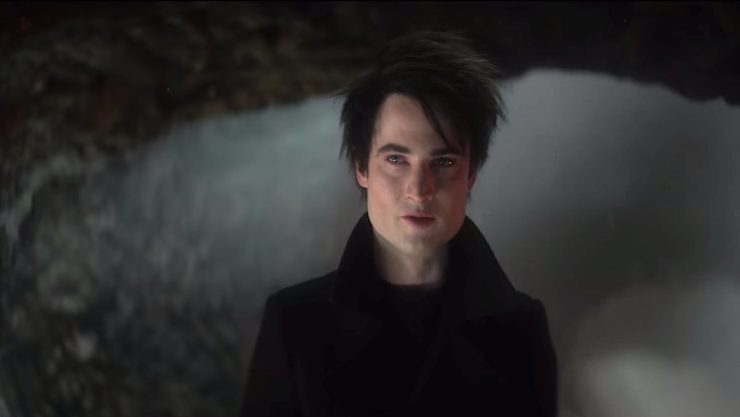Let’s get the obvious out of the way: Yes, it’s very good. Yes, it’s faithful to the comics in all the right ways, but also isn’t afraid to use the comics as a jumping off point that not only gives new life to the story, but makes me hopeful for the future seasons this show better get. Yes, the ending sets up one such future season. Yes, if it only gets one season the ten episodes here are satisfying as hell.
Honestly, I have a few minor issues, and I’ll talk about them below, but I watched this show in one marathon, stopping only a few times for basic necessities like gin, and for most of those ten hours I was very absorbed and very, very happy.
There’s a lot to unpack, and I’m only going to be able to skim the surface in this review! Given that, I’ll talk about the show generally for a few paragraphs, and warn you when I’m about to get into serious spoilers.
The show opens with a Raven soaring over the Dreaming as Morpheus introduces himself and explains his role. This could have been cheesy, but even here in the introduction, Morpheus is informing us that the thing we call reality is only a fraction of our lives, and that his realm is waiting whenever waking life wears us down—and the sarcasm dripping from the word “reality” will tell anyone new to this story most of what they need to know about the Dream Lord.
The first ten episodes are split between two arcs, the one collected in Preludes and Nocturnes and the one collected in A Doll’s House. For the Preludes and Nocturnes half, each episode falls into a discrete genre and tone: “Sleep of the Just” feels like Merchant Ivory adapted an occult mystery; “Imperfect Hosts” feels the most high-fantasy of the series; “Dream a Little Dream” (the one with Constantine) feels like slick, noir-ish urban fantasy; “A Hope in Hell” (the one with Lucifer) feels like the movie Constantine; “24/7” is brutal psychological horror; “The Sound of Her Wings” is—
—it’s—
“The Sound of her Wings” just feels like The Sandman. And it’s one of the best hours of TV I’ve seen this year, and I think I’m probably going to watch it at least once a month for the foreseeable future.
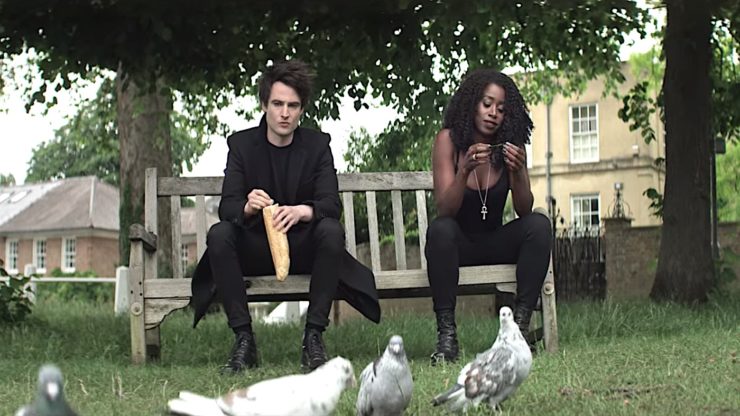
The Doll’s House arc is more of a complete flowing narrative, with some ties to characters and events from the first half of the season. If you’re looking to watch it in two marathons, I’d say take your break after “The Sound of Her Wings,” because the second arc is tense AF, and you’ll probably want to get through it. (I actually lost track of time watching it and was shocked when the tenth episode started—I was so involved I thought I was only up to episode nine.) But I think The Sandman might benefit from old school weekly appointment viewing more than a marathon.
That is one thing I should mention, though—the rapid tone shifts might be jarring to people who are coming to the show with no knowledge of the comics! If that’s you I’d urge you to stick with it, because I think the themes come together so beautifully by the end—I’d argue better than they do in the comics—that I think anyone who likes fantasy will find the show rewarding.
The acting is impeccable. If you told me that Alan Moore waved his enchanted Glycon puppet over a copy of The Absolute Sandman and these characters walked off the page and onto set, I wouldn’t be shocked. If the actor who plays Morpheus hadn’t worked, the show would have been dead in the water, but I’m finding it difficult to express how perfect Tom Sturridge is for the role. Obviously, he looks the part, but it’s more that he can project the imperious snottiness that makes Morpheus special, but also be wounded, but also be genuinely scary when he’s pissed. And under all that his belief in hope, and creativity, and the idea that humans can actually be remarkable creatures comes through, even when he’s moping.
Kirby Howell-Baptiste brings an incredible warmth to Death, as well as an adorable snarky big sister energy. I’ve sung Mason Alexander Park’s praises before, and will continue to: Desire can be annoying as shit (though they do have some points to make) but they made me want a Desire-centric spinoff immediately. And it never occurred to me to be attracted to The Corinthian? But Boyd Holbrook has made me question some things, and I don’t know how I feel about that? And all the denizens of the Dreaming were perfect, especially Vivienne Acheampong as Lucienne. I was worried I’d find Patton Oswalt distracting as Matthew but he had me at “fuck it, let’s go to Hell.” (Still fun to imagine a context in which Remy the rat would deliver that line, though.) And Gwendoline Christie! I’ve always like Lucifer, but her take on Lucifer is deadpan and chilling and fabulous.
The humans more than hold their own: Joely Richardson and David Thewlis are uncanny as mother and son. Kyo Ra brings out a great strength in Rose Walker that’s not as apparent in the comics version, John Cameron Mitchell is perfect as Hal—warm and quippy right up until the moment he has to show a brittle core. All the “Cereal Convention” guests are hilarious.
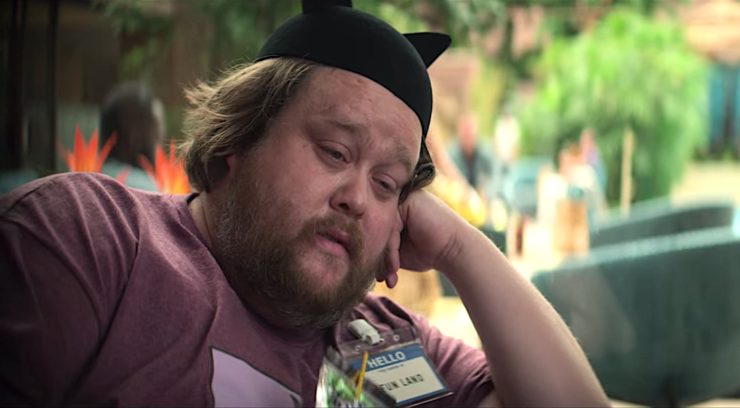
I’ve already mentioned “The Sound of Her Wings,” but I do want to give a special nod to “24/7.” “24 Hours” was the issue that really tipped The Sandman into horror, but it tipped a little bit into “look how depraved we can be,” and once the shock value wore off there wasn’t much there. While still gruesome, “24/7” the episode roots its horror in character (particularly in Bette, a frustrated writer/waitress) and I think becomes more chilling than its comic of origin.
This adaptation isn’t perfect (although perfection is boring, so) but there are a few things that wobbled enough that I’ll mention them. Lyta’s arc felt rushed and a little cobbled together—this was the one storyline that needed a little more realism to land, at least for me. More frustrating was that Jed and Rose both roll with terrible, shattering trauma far too well. Sure, there’s a larger story unfolding, and we can’t stop and have an episode-long therapy session, but I wanted a little more acknowledgement that they’d both be catatonic after all the shit that’s thrown at them. Jenna Coleman was fantastic as Johanna Constantine (both versions) but I found myself getting caught in period details. In a flashback, Johanna is dressed in an outfit that screamed early-90s to me: high waisted lightwash jeans, black T-shirt, lots of silver rings. (tbh it also screamed “Preacher reference.”) A riff on that look is popular now, but this is clearly the past. The thing that bothered me was… how far in the past? If she was a teen during the flashback she’d be in her 40s now, but Coleman doesn’t seem to be a teen then, nor a middle-aged warlock now, and in the comics the events the flashback is referring to happened ten years in John Constantine’s past, not thirty, but (pushes glasses up nose)—hang on, am I getting too hung up on comics chronology? The very thing I was happy about the show not doing?
Maybe. But I still wanted a little more solid ground in Johanna’s episode.
But I also want to point out that Constantine’s band is apparently now “Mucha’s Membrane” rather than “Mucous Membrane,” and I LOVE THAT. And I want a whole spinoff about her friendship with the vicar. Is the world ready for Grantchestertine?
One of things that makes the show so successful is the way it deepens the comics storylines. “Sleep of the Just” takes the story of poor Alex Burgess and makes it a grand tragedy. Alex isn’t just a spineless boy who leaves Morpheus locked up in the hopes of the same immortality and riches his father asked for—he’s lonely, abused, terrified, attracted to Morpheus and repelled by him in equal measure. He wants to free him, but he also wants to win his father’s love. Later, he says he wants to free him, but lives in fear of the vengeance Morpheus might take if he lets him out. Likewise, his relationship with Paul is turned into a class-defying romance, with references to Merchant/Ivory’s adaptation of E.M. Forster’s queer classic Maurice, and shout outs to Evelyn Waugh. Ethel Cripps is given her own arc as a canny, resourceful woman rather than just an unfaithful thief. The Corinthian is a major antagonist now, with a motivation that goes beyond “kill people and eat their eyeballs.” Instead of Lucian, the slightly snarky but loyal-to-a-fault librarian, we get Lucienne, who’s been running the Dreaming in Morpheus’ absence for over a century, and now has to find a way to use her talents without stepping on her Lord’s toes. And rather than tying DC canon into a bow with Nightmares named Brute and Glob, the show….
Hmm, I’m going to get into some spoilers now, I think, so if you want to go in cold, which I recommend, hop down the bolded “Spoilers over” message six paragraphs down.
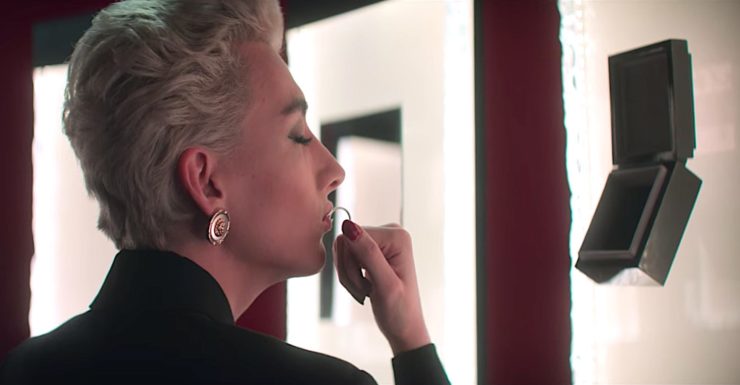
As I was saying, rather than tying DC canon into a bow with Nightmares named Brute and Glob, the show gives us a new character, a Nightmare named Gault who wants nothing more than to be a child’s perfect recurring dream. And Gault is an unbelievable upgrade—not a petty like Brute and Glob, not just holidaying as a human like Fiddler’s Green, or, um, kinda fucked up like the Corinthian, but a real person with will and desire all her own. Dream’s condemnation of her is an excellent way to show us the arrogant, inflexible bastard Morpheus has been for much of his life, and his change of heart toward her has the potential to push the adaptation in a very different direction than the comics series.
Stripping the DC continuity from the show also strengthens the parallels between the “Preludes and Nocturnes” and “Doll’s House” arcs. As Morpheus is imprisoned, Jed is imprisoned; as Morpheus is ruler of the Dreaming, so Rose could be ruler. But here the similarities end: Jed’s family refuses to give up on him. Rose’s mother searched for him until her own death, and we watch Rose continue the search, blanketing Florida with missing posters and refusing to take “no” as an answer from the foster care rep. Meanwhile Dream was trapped, naked, for over a century, and none of his fellow Endless lifted a finger—well, except Desire, but that certainly wasn’t to help him. Rose uses her growing power to find Jed, rebuilds walls to protect her friends from each other’s dreams, threatens Morpheus when he harasses Lyta, and finally agrees to die for the good of the world. Dream throws a temper tantrum when he notices that Lucienne has been doing his job for one hundred years, and then casts a Nightmare into Darkness for daring to want to be a pleasant Dream.
But Dream begins to change, by the end—or maybe more accurately, he allows some of his life experience to seep into his behavior. He begins to look at Hob Gadling and Rose Walker as people who might have something to teach him, rather than short-lived inconveniences, and he begins to treat Lucienne as something closer to an equal. I love that the writers decided to tease out Dream’s sense of abandonment and betrayal here—much more so than in the comic—because it might lead to some fascinating emotional knots down the line if the show gets more seasons.
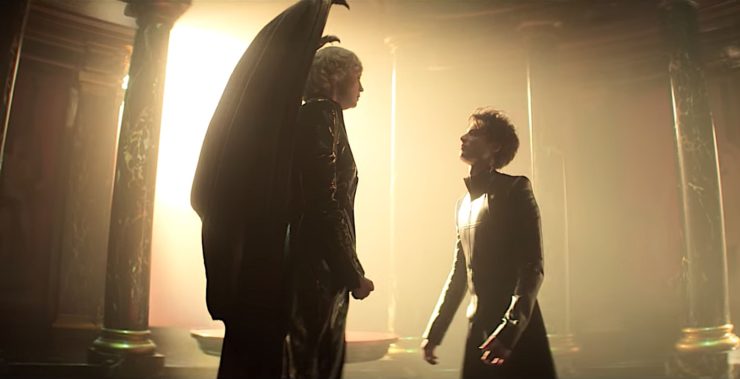
I’ve been trying to think of my favorite element in the series (other than “The Sound of Her Wings”) and, shockingly, I think it’s the poetry slam in Hell. Now in the comics this is an exercise that borders on cheesy—Morpheus has to win his Helm back from a demon named Choronzon, and the demon challenges him to the oldest form of battle: a storytelling contest. (Basically mythic Verzus.) The contest is framed as a spoken word competition, and Hell Itself transforms so completely into an ‘80s club, you can almost see Kinison working the door just off-panel. As Morpheus and Choronzon speak, their stories seem to take form in the air around them—Choronzon describes a wolf, Morpheus describes a hunter, Morpheus describes a universe, Choronzon describes “anti-life”—and while we see what they’re describing, it feels remote. (It doesn’t help that Choronzon is a demonic rando, and not a worthy adversary for our Dream Lord protagonist.) The show transforms the contest into a tense fight between Morpheus, who is barely holding his terror in check, and the demon whom Choronzon chooses as his champion: Lucifer Morningstar.
Now we fall into their stories—when Lucifer becomes a direwolf, Dream becomes a hunter on horseback, who pierces the wolf’s hide with an arrow, and it’s Lucifer who bleeds real blood from a fresh wound. When Lucifer describes a venomous snake biting the horse and his rider, it’s Morpheus who sickens and staggers. By the end both beings are scarred and weak, and when Lucifer seems to win, it’s because Morpheus is, to all appearances, fucking dead. The thing that read like a slam poetry contest in the comic is now mortal combat. It underlines just how seriously you should take the art of storytelling in The Sandman, and it sets up the enmity between the Dream Lord and the Oldest Enemy.
And—look I’m going to have more to say, but this review’s already running long. Let’s get back to the non-spoiler section.
Spoilers over, come back!
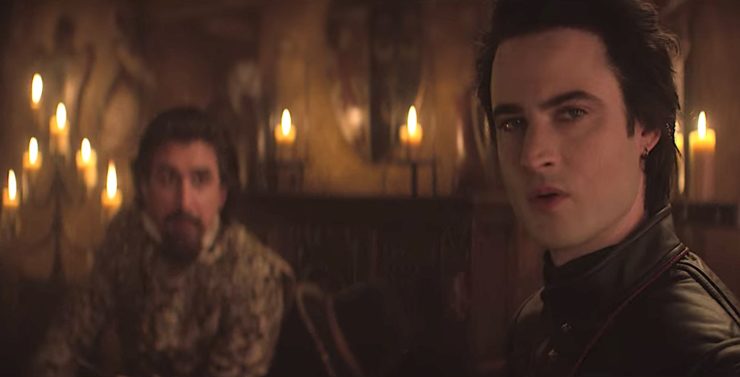
I think The Sandman is a fantastic achievement. While I know one of my coworkers wasn’t into the costuming, and another didn’t think all the visuals worked, I thought the look of the show worked for the most part, and gave us some grandeur without looking too CGI’ed. The casting was note-perfect, the soundtrack was great, they didn’t lean too hard on pop songs with the word “dream” in them, each of the many time periods felt right (I mean I didn’t live through the 1500s, to the best of my memory, but it felt like it did when I read “Men of Good Fortune”), and I loved that Morpheus was consistently more concerned for the welfare of animals, be they ravens or gargoyles, than people.
The themes of change are, if anything, stronger here. Can dreams change? Not like the dreams humans have for their lives, but the Dreams and Nightmares Morpheus creates? Do they have will and autonomy? At one point, Morpheus rebukes a mortal’s involvement in the slave trade on precisely these grounds—what gives anyone the right to steal someone’s free choice away from them? But then if Morpheus believes that, doesn’t he owe that same respect to his creations, if they grow beyond his plans for them? Are they clockwork creations, or his children?
Of all the fantasy adaptations and comics shows coming this year, this show is the one I had the highest hopes and the most trepidation for this year. To be able to say that it exceeded every expectation makes me giddy.
Leah Schnelbach does not get giddy often. Join them in the slam poetry battle in Hell that is Twitter!










